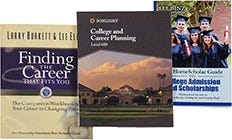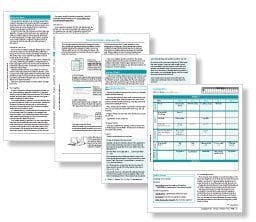Homeschooling in Massachusetts: Guidance for Getting Started
Get the inside scoop on Massachusetts homeschooling information with this detailed guide. If you’re new to the prospect of homeschooling in Massachusetts and wondering how it all works, you’ve come to the right spot. Although there is variation throughout the state, if you read through to the end of this webpage, you’ll have a much firmer grasp on the requirements and laws to follow: what forms to file, what materials you’ll need, what subjects you have to teach, how much homeschooling costs, and exactly what first steps to take.
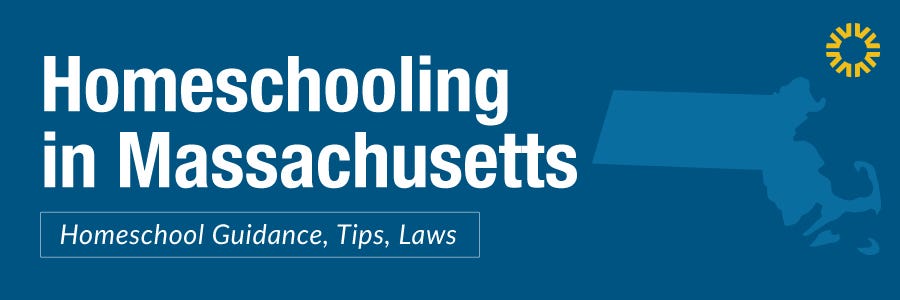
DISCLAIMER: This article is not written as legal advice. Check with your local school board and official Massachusetts laws before making decisions about educating your children.

Is it easy to homeschool in Massachusetts?
Massachusetts is one of the five states identified by HSLDA as having strict homeschool laws along with New York, Vermont, Rhode Island, and Pennsylvania. But this simply means that Massachusetts provides more oversight of homeschool families than many states do. It doesn’t mean that the actual act of homeschooling is any different. It simply means that you’ll have a few extra hoops to jump through, a bit of recordkeeping to handle, and some forms to file. It’s totally doable! So don’t let the “high regulation” label frighten you from choosing to homeschool in the Pilgrim State.

The G. Family, Sonlighters from North Dartmouth, MA
Requirements for Homeschooling in Massachusetts
Another aspect of Massachusetts homeschooling that makes it a bit challenging is that it’s not regulated at the state level but at the school district level. Although there are basic statewide rules for homeschooling in Massachusetts, the specifics are determined locally and may vary quite a bit from area to area. So please take the advice in this article as general guidance that may be slightly different in your specific situation. Always check with the superintendent of your local schools to get the final word.
How many days are required for homeschool in Massachusetts?
The state Department of Education website states that
The requirements that apply to public schools, such as educator licensing orstructured learning time, do not apply to home schooling.”
So officially, the state of Massachusetts does not outline homeschooling hour requirements. However, your local district will probably ask you how many school days you plan to fulfill.
To minimize friction between your homeschool and the district, it makes sense to match your proposed homeschool days to the public school requirements—180 days , 900 (or 990) hours per school year. In public schools, a total of 900 instructional hours are required for elementary grades and 990 at the secondary level. Advocates for Home Education in Massachusetts, Inc. has some great tips for how to word this in your official documents.
Since homeschooling is vastly more efficient than public school, you may wonder how you can possibly demonstrate so many instructional hours. It’s quite easy when you remember that instructional hours aren’t just bookwork. They can include field trips, educational games, watching documentaries, co-op classes, extracurriculars, many life skills activities, etc.
› Do parents need qualifications to homeschool in Massachusetts?
No, homeschool parents don’t have any specific state-mandated qualifications to homeschool. However, the school district may evaluate thecompetencyof the parents to provide a quality education. The question of competency does not refer to college degrees or certifications but is more about general ability and about good morals. Are you able and willing to follow a plan and guide your child through a course of study? Are you a moral person? Then you likely meet Massachucetts’s competency requirement.
› Do you have to be certified to homeschool in Massachusetts?
No, parents merely must be deemed competent in ability and morals in order to be qualified to homeschool.Being certified is not necessary.
› Who is eligible for homeschooling in Massachusetts?
Any parent who follows the outlined requirements for homeschooling is eligible to homeschool. Youdoneed to report homeschooling in Massachusetts. So as long as you are deemed competent, file an intent to homeschool, submit and follow an approved homeschool plan, and fulfill the evaluation requirements, you are eligible to homeschool.
› Is unschooling legal in Massachusetts?
The Charles case in Massachusetts states that school districts cannot regulate the manner of teaching.
"The superintendent or school committee must also have access to the textbooks, workbooks, and other instructional aids to be used by the children and to the lesson plans and teaching manuals to be used by the parents. This access is necessary only to determine the type of subjects to be taught and the grade level of the instruction for comparison purposes with the curriculum of the public schools. The superintendent or school committee may not use this access to dictate the manner in which the subjects will be taught."
Thus, unschooling is a legal method of homeschooling in Massachusetts.
› Can I homeschool someone else's child in Massachusetts?
The law only refers toparents, but legal guardians would surely have the same legal rights to homeschool their children. While there is no stipulation that all instruction must come from the parent, the intent to homeschool and the homeschool plan is filed by the parent, and thus the parent is the one legally responsible to the district to educate the child. Check with your local district for clearer guidance on this matter.
What are homeschool requirements in Massachusetts?
Instead of detailed statewide guidelines, in Massachusetts, homeschool requirements are set at the local school district level.
Thus you’ll need to cooperate with the school district where you reside, filing paperwork and crafting a homeschool plan. Your district will provide you with a list of criteria for that plan. More than likely it will ask you to outline your intent for these key areas:
- content
- instructional materials
- duration and frequency of instruction
- methods of instruction
- evaluation
- adequate progress
Follow the guidelines provided and ask the district questions if you’re unsure. If your plan is not deemed acceptable, you will have a chance to modify it and submit it again. AHEM has great tips for how to word your plan in a way that will satisfy the educators evaluating it.
Massachusetts homeschooling requirements also outline specific subjects to be taught (at all grade levels): spelling, reading, writing, English language and grammar, geography, arithmetic, drawing, music, United States history and the Constitution, duties of citizenship, health, physical education, and good behavior. Your homeschool plan should probably include this list and the materials/experiences you will use for each topic.
The superintendent of your school district may require periodic standardized tests to ensure the progress of your child. In some cases there may be alternate ways to show progress instead of a standardized test. This is something you may be able to negotiate with your district.
MA Home Learning has an excellent guide for homeschooling requirements in Massachusetts. Just remember to always use the material your local district provides as the ultimate authority.

dThe G. Family, Sonlighters from North Dartmouth, MA
Do you have to have a curriculum for homeschooling in Massachusetts?
Your Massachusetts district will ask you what instructional materials you’ll use to teach the thirteen required subjects:
- spelling
- reading
- writing
- English language and grammar
- geography
- arithmetic
- drawing
- music
- United States history and the Constitution
- duties of citizenship
- health
- physical education
- good behavior
Thus curriculum isn’t required per se, but it is expected that you’ll use something to teach. That is, you might be able to teach some topics outside of a formal curriculum, but you’ll still need some type of material or experience.
Certainly, using a ready-made curriculum is preferred to taking a DIY approach. Not only is a curriculum easier on you (no planning), but it is also more smoothly communicated to your district. When you mention what program you’re using, it gives the assessor a sense of confidence in your homeschool plan.
When you choose a Sonlight All-Subjects Package, you can customize a program that not only fulfills the Massachusetts requirements but also fits your child to a tee.
See the scope and sequence of each program here. If you have concerns about your Sonlight choices not fulfilling the MA requirements, reach out to an Advisor who can walk you through exactly what’s included in each program.
The pandemic made it clear that children, especially young students, learn best when they are in the presence of their teacher, getting direct instruction. Online learning simply isn’t an adequate way for little kids to master the skills they need. So as you consider different homeschooling programs in Massachusetts, know that an at-home curriculum that relies on you and your child enjoying physical books together is far superior to online homeschooling.
Do homeschoolers have to take standardized tests in Massachusetts?
In the Codfish State, a district superintendent may require periodic standardized testing as a means to measure adequate progress. However, in many districts, the need for assessing progress can be done via alternate means such as a portfolio review. Check with your local school system to find out if standardized testing is mandatory or if you can reach the same objective via other means.
What do I need to homeschool my child in Massachusetts?
Because the school district forms you’re required to file ask about what materials you’ll be using, it’s important to sort out the curriculum question before you even file an intent to homeschool. Use these three extensive guides to figure out your preferred homeschool style and the materials you’ll need to get started.
1 Homeschool Options & Types
2 Homeschooling Resources, Printables, FAQs: Tips for Getting Started
3 How to Choose Your Sonlight Curriculum
While Massachusetts does not require any specific records as proof of homeschooling, it’s good practice to keep your own file of documents:
While Massachusetts does not require any specific records as proof of homeschooling, it’s good practice to keep your own file of documents:
- records of instructional days/hours
- samples of student work and photos of hands-on projects
- where applicable, grades and standardized test scores
- list of materials used—books read, curriculum studied, documentaries watched
- list of field trips, extracurricular activities, and co-ops
- a copy of your intent to homeschool and your approved homeschool plan

To make recordkeeping easy, opt for the Sonlight homeschool planner. It has pre-made templates for everything you’d want to keep track of as a Massachusetts homeschooler—and more, like meal planning, chores, and goal setting.
Getting Starting & Timing as a Homeschooler in Massachusetts
If you’re convinced of the benefits of homeschooling in Massachusetts and want to know how it all works in the Bay State, keep reading for the steps and specific examples. Learn how to get started, what age you need to start homeschooling, and how long you can homeschool.
How do I start homeschooling in Massachusetts?
Homeschooling is regulated in Massachusetts through the school district where the family lives instead of at the state level. So the details will vary. But in all cases you’ll be filing both an intent to homeschool and a homeschool plan. In some cases, this is a single form. In most cases, this is an annual document.
For the most accurate information, find the official website for your school district. Then search that site for the homeschool (or home school, two words) page. From there you can identify if the district has specific homeschooling forms to file, what the homeschool plan must include, and who to contact with questions.
For example, here are three of the largest school districts in the state and their rules for how to enroll in homeschooling:
1 Boston Public Schools
Visit the official homeschool page.
Boston Public Schools provides online forms for three grade divisions: grades 1-5, middle school, and high school. Among other things, this form asks for a list of instructional materials and how you’ll fulfill the end-of-year assessment.
2 Springfield Public Schools
Visit the official homeschool page.
Springfield Public Schools provides one PDF form which you fill out and email (or mail) back. It’s fairly open ended and asks for attached documentation of background on the instructor, a description of the proposed curriculum, the number of hours of instruction, a description of the methods to be used, and the type of end-of-year assessment.
3 Worcester Public Schools
Visit the official homeschool page.
Worcester Public Schools allows parents to submit answers to these four questions in any format.
- What is the proposed curriculum and number of hours of instruction per subject?
- What is the competency of the individuals who will be instructing the student?
- What textbooks, workbooks, and instructional materials will be used?
- What procedures will be used to assess student progress and maintain a student record?
For convenience, there are two PDF forms: one for grades 1-6 and another for grades 7-12. These forms are provided in seven languages besides English. This school system has also assembled a very helpful slidedeck with examples and guidance.
No matter what school district you’re in, if you’re switching from public to homeschooling in Massachusetts, be sure to first get your homeschool plan approved prior to withdrawing your child from public school.
At what age is school mandatory in Massachusetts?
Massachusetts law requires compulsory schooling from ages 6 to 16.
To meet this requirement as a homeschooler, be sure to have your intent to homeschool and your homeschool plan squared away with your local school district before September of the calendar year when your child turns 6. In subsequent years, your district probably will require the form to be submitted anew.
Can you skip kindergarten in Massachusetts?
Since mandatory schooling starts at age 6 in Massachusetts, yes, you can skip kindergarten and start formal homeschooling with first grade at age 6. Or you can provide preschool or kindergarten at home without filing an intent to homeschool.
Homeschooling kindergarten or preschool in Massachusetts can be done at home with ease by using one of the three excellent programs below.
Read more here to figure out which one is best for your child. And reach out to an Advisor for free assistance if you’re still unsure.
How long can you homeschool a child in Massachusetts?
You can homeschool for an entire education from preschool through high school graduation. Or you can opt to homeschool for just one year and then return to public school. It’s not uncommon for families to homeschool for a season of 2-5 years and then switch to other choices like private school or public school. But there are plenty of other families who feel called to homeschool and navigate this educational choice all the way from early education to a teen’s senior year of high school. The choice is up to you!
Must-see Massachusetts Field Trips for Homeschoolers
A public school student, at best, may take one or two field trips per school year. But as a homeschooler, you can expose your children to multiple meaningful excursions whenever you like! Those day trips rightfully count as instructional hours. Not only do you broaden your children’s horizons, but you also reinforce their lessons with tangible, firsthand experiences.
Field trips can be nature-based, history-themed, arts-centered, or science-focused. No matter the type of locale, the learning opportunities are rich. Call ahead and ask to see what special programs, private docent tours, and homeschooler discounts may be available to you.
Keep track of your field trips with our free printable field trip log—an excerpt from the Sonlight homeschool planner.

What are the best field trips for homeschoolers in Massachusetts?
Here’s a short list of the possible field trips available to Massachusetts homeschoolers
- All the National Parks in Massachusetts.
- The Freedom Trail which includes the Paul Revere House and the USS Constitution AKA Old Ironsides, among multiple other renown spots from American History
- John F. Kennedy: Presidential Library and Museum
- Battleship Cove: Fleet Museum
- Old Sturbridge Village
- Plimoth Patuxet Museums
- Peabody Essex Museum
- Massachusetts Science Center
- Museum of Science- Boston
- New England Aquarium
- Massachusetts Air and Space Museum
- New Bedford Whaling Museum
- New England Pirate Museum
Financial Considerations for Homeschooling in Massachusetts
If you live in Massachusetts, you already know that it has an incredibly high cost of living, consistently appearing in various rankings in the top five of most expensive states. Will homeschooling cost you more because you live in a pricey state? Possibly.
The good news is that curriculum is priced the same nationwide, so you won’t have to pay a premium based on your geographic location when it comes to the bulk of your materials. But for school supplies and extracurriculars, your costs will likely be on the higher end.
How much does it cost to homeschool in Massachusetts?
It’s going to cost you money to educate your kids at home. But according to your means, homeschooling can be done frugally or with the spirit of a spendthrift.
Explore the cost of homeschooling in Massachusetts more deeply with the help of our detailed guide How Much Does Homeschooling Cost? According to that resource, the annual expense to homeschool one child costs between $500 - $2500 annually.

› Does Massachusetts pay for homeschooling?
There are no Massachusetts grants for homeschooling, and Massachusetts does not have a school voucher program for homeschooling.
› How can I homeschool in Massachusetts for free?
Your school district will not supply free homeschooling resources for Massachusetts homeschoolers. So you’re on your own for finding, choosing, and financing your curriculum.
But are there other ways to manage free homeschooling in Massachusetts? Well, yes, you could theoretically cobble together a conglomeration of online free printables, borrowed library books, and free YouTube videos. But it will take you quite some time to gather and document all of those resources, especially since you have to submit them in your official homeschool plan to your district before your school year.
It makes more sense to go the safer—and seamless—route by purchasing a pre-planned curriculum. Make your dollars go father by choosing a program that checks these boxes:
- a curriculum that builds a cherished home library instead of disposable workbooks
- a program that can be used with multiple children at once and for younger siblings in subsequent years
- a course of study that has a payment plan
- a trusted curriculum that has a money back guarantee
› Can I get money from the state for homeschooling?
No, Massachusetts does not provide any state funding for homeschooling.
› Is homeschooling in Massachusetts a tax write-off?
No, homeschooling is not tax-deductible or a tax write-off in Massachusetts.
› Do I have to pay school taxes if I homeschool?
Yes, homeschooling does not negate your tax obligation. You still have to pay taxes even if you homeschool.
Partnering with Schools in Massachusetts
Each school district establishes its own policy about allowing homeschoolers to participate in courses, programs, extracurricular activities, and athletics. These decisions are not made at the state level, so contact your local district to see what options are available.
For example, here’s an excerpt from the Boston Public Schools website:
Q: Can my student participate in sports, extracurriculars, or high school events such as prom or graduation?
A: Although some individual schools are open to homeschoolers participating in extracurriculars, we do not officially provide these opportunities via the district. Homeschooled students are not eligible to receive diplomas from BPS schools.
Christian Homeschooling in Massachusetts
For many families, the choice to homeschool is inspired at least in part by a desire to adhere to the Biblical exhortation found in Deut. 6:5-7.
Love the LORD your God with all your heart and with all your soul and with all your strength. These commandments that I give you today are to be upon your hearts. Impress them on your children. Talk about them when you sit at home and when you walk along the road, when you lie down and when you get up.
Training up children in the Lord is one of the original goals of Sonlight. So if it’s yours, too, then Sonlight may be the perfect fit for your family. Try it out by taking the Sonlight invitation.
When you use Sonlight, it’s easy to homeschool with a Christian perspective because the Bible, missionary stories, and a Christian worldview are seamlessly woven into each History / Bible / Literature program.
Find out what makes Sonlight a Christian curriculum here.
Your entire family unit can enjoy the same great books and discuss them together. Sonlight books are chosen for their redemptive themes and uncanny ability to spark discussions. Your Instructor’s Guide will suggest questions for initiating those discussions, so you aren’t left floundering. For many families, these heart-to-heart discussions are priceless moments of bonding, exploring faith in action, and digging deep into exactly what it means to serve Christ in this world.

The S. Family, Sonlighters from Attleboro, MA
Finding Homeschool Community in Massachusetts
Deciding to homeschool is a huge choice. It can feel scary to blaze your own path and say no to the expected path of public schooling. At times you may question your choice and wonder about your ability to teach your children. That’s where a homeschool community comes to the rescue.
When you connect with other homeschoolers, you realize that nearly all your fears are common homeschool concerns (and fairly simple to resolve).
Start your search for your homeschool besties at state-wide homeschooling organizations in Massachusetts like
Massachusetts Homeschool Organization of Parent Educators (MassHOPE)
Massachusetts Home Learning Association (MHLA)
Advocates for Home Education in Massachusetts, Inc. (AHEM)
Some of these sites host in-person events and/or have directories for local in-person groups.
You can also visit the Sonlight Connections page where you can connect online with other Sonlighters through the app.
Homeschooling High School in Massachusetts
In the timeline of homeschooling, high school is when the rewards deepen for both you and your teen. Because of your freedom to choose curriculum, select relevant electives, and invest time into meaningful work, internships, or volunteering, you have an opportunity to give your teen a high school education that is unparalleled in a public school.
Watch these two videos for inspiration about homeschooling through the upper grades.
Mandatory schooling in Massachusetts is required through age 16. This means that once your child turns 16, you are no longer obligated to report your homeschool plan to your local school district. MHLA suggests that in this case you write a letter to your district, explaining that you will stop filing an intent to homeschool and your homeschool plan.
Of course, you’ll want to continue homeschooling and keeping records through 12th grade, award a high school diploma, and make sure your child has met (or surpassed) the minimum prerequisites for our teen’s future goals such as military service, technical school, or college.
These two resources are a great starting point for making your 4-year high school plan.
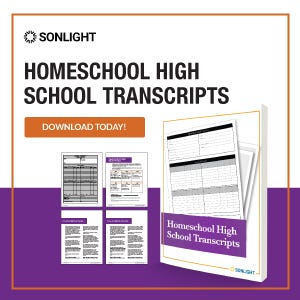
While you’re still obligated to teach the designated subjects (spelling, reading, writing, English language and grammar, geography, arithmetic, drawing, music, United States history and the Constitution, duties of citizenship, health, physical education, and good behavior), as a homeschooler you are free to assign high school credits, give grades, award a diploma, and issue a transcript. These details will be necessary for your teen’s next steps into adulthood. You can even give your senior a graduation ceremony.
Sonlight’s homeschool curriculum for high schoolers is robust, prepares a teen for college, and allows for a great deal of personalization.
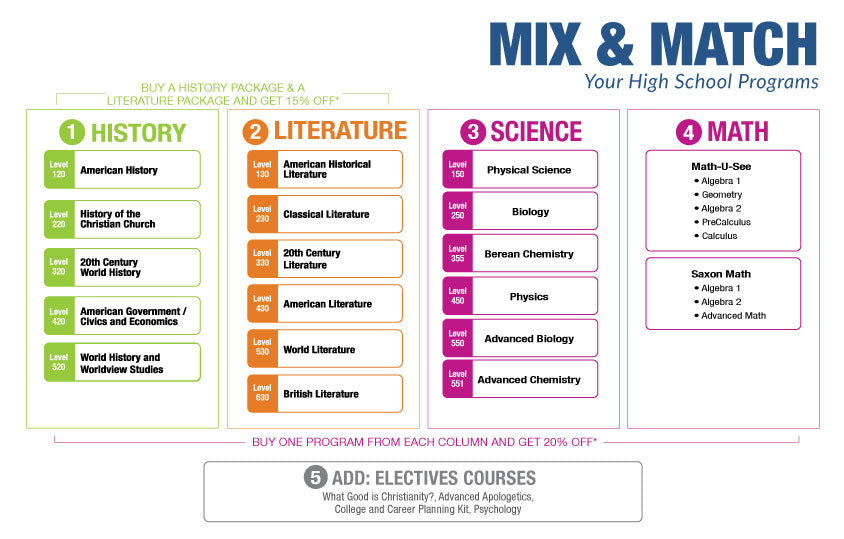
If your child is college-bound, keep an eye to admissions prerequisites. Keep good records and be sure your homeschool-issued transcript includes the necessary credits and courses. For example, The University of Massachusetts Amherst outlinesfirst-year undergraduate requirementsand even what home-schooled applicants need to submit. Colleges tend to be very homeschool-friendly, so don’t be afraid to reach out and inquire about the way homeschoolers are assessed in comparison to their public school peers.

REQUEST A FREE CATALOG
Find your ideal homeschool curriculum in the pages of Sonlight's free catalog. Browse Sonlight's award-winning literature-based curriculum and academically excellent products in all subjects—for all grades.






